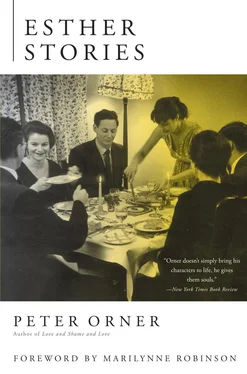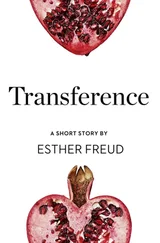He was a short, bulbous man, much smaller than Growling Poe, with a missing front tooth. When he spoke, his voice whistled out in a soft hiss. He had the accent of a far-off place which we couldn’t, even with an atlas, identify. Somebody said he might be from Missouri, but somebody with an Aunt Leona in St. Louis insisted that if he was from anywhere, he was from south of Cape Girardeau. We never asked him directly. None of us ever spoke to either Poe, and Smiling Poe was even more unapproachable than Growling Poe, who, though he spoke harshly to our grocers, florists, and stationers, at least made pretense of conversation. For instance, Growling Poe would say things like: “You call this an avocado?” or “Is there a particular day of the week you don’t cheat people? The Lord’s Day, perhaps?” Smiling Poe, on the other hand, always spoke politely, but always at, never to. He was the one who scared us, and although his show was slow in spots, especially during his ten-minute attack on that vapid Professor Longfellow, the horror of emptiness, the sadness of the tomb, lurked in every word he softly uttered. During “The Cask of Amontillado” you could hear drunken Fortunato’s groans for mercy as if they were pleading from your own chest. It wasn’t pleasant, Smiling Poe’s show, but it was necessary. Yet, twice was enough dread, even for me. Who wants to be reminded more than that that we’re all Fortunato? That we’ll all, every one of us, beg the joke over as the mason walls us in?
The fact of his being still down there began to grate — and it went beyond my nerves. Other people had the same notions, but nobody dared talk about it. You didn’t need to see his show more than once to feel his presence all over town. Tuesday, Thursday, and Saturday, that same death drifting up out of the basement. Monday, Wednesday, Friday were an imitation — this we could tolerate. We started ignoring Smiling Poe harder. When we saw him haunting the sidewalks, we ducked into insurance agents’ offices or the dry cleaners to avoid seeing his face and that missing tooth. Growling Poe got blithery about parking tickets and bad vegetables and bird shit on the hood of his rented Toyota and, though not a stellar actor, was at least human. Smiling Poe walked above us with that grin that jutted from his lips like a knife blade, and after thirty weeks of it we began to sympathize with Rita Larry-Pontewitz’s campaign to ban the real Poe from the library and his impersonators from our city limits. Growling Poe if only because his clothes and big forehead reminded us too much of Smiling Poe.
And still they gave shows — ticket prices had long since been slashed in half — always to unsuspecting tourists hungering for a bargain (who cared what it was?) who’d been lured to town by Rita and Hal, who had put us on the map. We were starting to become known as the town that couldn’t get rid of its Poes. Until. Isn’t there always an “until” in stories of death? And what story is not, finally, a death?
It happened on a Tuesday night during Smiling Poe’s show. It was almost spring, and after a long winter, tourist attendance for the shows had actually been picking up. That night Hal Hodapp, who was handing out flyers in the Historical Society foyer advertising our glassblowing exhibition, had counted five people descending into the catacombs when he noticed that one of them was Growling Poe in disguise. Hal said it wasn’t a very good disguise, but different enough for him that he looked like a new man. He was dressed as an average guy about our town, his hair combed forward, wearing a faded Izod shirt, circa 1972. Hal was curious, because to his knowledge neither Poe had ever seen the other’s show, so he followed the short line downstairs. He told us later at the Blue Parrot that it was a virtuoso performance, the best he’d ever seen in person or listened to from the laundry chute. That Smiling Poe looked like he’d lost weight, that his face had begun to shrivel, raisin-like, and his one front tooth gleamed a hideous yellow in the shallow light. Two cats rubbed against his legs, and what was so terrible, Hal said, was that Smiling Poe acted kindly toward the cats, that often in the middle of the show he reached down with his skull-colored hands and rubbed them. Those cats. Hal said all he wanted was to leave and go upstairs and curl up with his electric blanket turned all the way to twelve, because Smiling Poe emanated cold, even as his hand stroked the cats. But he had stayed because he wanted to watch Growling Poe’s reactions. And at our table at the Blue Parrot, Hal said Growling Poe’s face during the show reminded him of the men he’d imagined about to be beheaded in that very room. Because his eyes never moved, never twitched.
No one will ever know if he planned it in advance or if it came to him in a sudden jolt of jealous inspiration, but during Smiling Poe’s almost entirely whispered “Raven,” Growling Poe threw his voice at the very moment of the bird’s first “Nevermore.” Growling Poe was as mediocre a ventriloquist as he was an actor, Hal said, but it was good enough, and Smiling Poe looked up at the corner to the left of the papier-mâché bust of Pallas, and he didn’t stop, didn’t say, “Nevermore,” just went on with the poem. Each time it was the bird’s turn to talk, he let the corner do it. Hal said that by the third or fourth time, all four tourists from Bangor knew it was the guy in the third row, in the pale golf shirt, but by that time Smiling Poe believed in the voice.
Hal’s eyes got red, and he thrust down the last of his 7-Up. “I tell you, the man thought he’d reached beyond the grave, that after thousands of ‘Ravens’ he’d finally broken through to someone. To the devil, to God, to Poe himself, or—” Hal paused and we all leaned forward. I noticed Hal’s gums had turned the color of ash. “Or, to his own Lenore.”
When he reached the poem’s final moment, Smiling Poe said so softly you had to strain to hear him, like a man swimming to the surface of a dream:
And my soul from out that shadow that lies
floating on the floor
Shall be lifted—
And he waited, as though he actually expected the dread word to come later than before. And he stood there smiling that awful smile, his legs akimbo.
Shall be lifted—
And still there was nothing from the corner.
“I didn’t look at Growling Poe at that point,” Hal said. “How could I? Man so cruel to lead another man into belief and then rip the rug out like it’s nothing.”
Smiling Poe didn’t continue. Hal told us that after his unfinished “Raven,” he just walked out, although there was a good fifteen minutes left in his show and Montresor still had to murder Fortunato. They listened to his slow clod up the stairs. Nobody moved. Everybody, even the cats, watched the corner. Hal said he even prayed. Then Hal backed up his chair, dropped three quarters on the table, and left us. We listened to one of the quarters bounce and spin before landing flat, and we felt ashamed, though we couldn’t have said why. And even now, even years after, when shame still coats us like the fine dust we often wear, thanks to the cement factory north of town, we still can’t say why.
They found him Wednesday morning drooping from a light fixture in his hotel room. There was an unfinished sandwich on the table and two black suits in the closet. The coroner said, medically speaking, Smiling Poe had been dead for at least eight hours, but the cleaning woman who found him swore — she still swears — that when she opened the door he was still writhing, that he didn’t stop moving until she touched him, poor man, never seen anybody look so lonely — not dead, lonely.
THE PHONE deadly silent, I recall a certain pair of shoes.
Читать дальше












